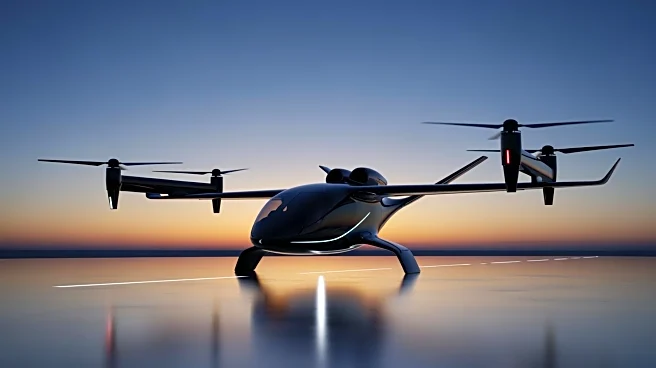What's Happening?
Honda R&D is progressing with its electric vertical-takeoff-and-landing (eVTOL) aircraft, having secured early engagement authority from the U.S. Federal Aviation Administration (FAA). The company is showcasing
its advancements at the Dubai Airshow, focusing on finalizing technologies for the eVTOL product. Graeme Froggatt, director of programs for Honda R&D, emphasized that the company is not rushing to certification but is instead ensuring the technology is suitable for the vehicle. Honda has developed three one-third-sized technology demonstrators that have successfully transitioned from vertical to horizontal flight. Final testing on a full-size model is underway, with expectations to fly early next year.
Why It's Important?
The development of eVTOL aircraft by Honda represents a significant step in the evolution of urban air mobility. This technology could revolutionize transportation by providing efficient, environmentally friendly alternatives to traditional vehicles. The involvement of the FAA indicates regulatory support, which is crucial for the integration of eVTOLs into existing airspace. Honda's approach, leveraging its extensive technological resources, positions it as a potential leader in this emerging market. The successful implementation of eVTOLs could lead to reduced traffic congestion and lower emissions, benefiting urban environments and contributing to sustainable transportation solutions.
What's Next?
Honda plans to finalize the configuration of its eVTOL aircraft in the coming years, aiming for certification in the 2030s. The company is strategically timing its market entry to align with industry readiness, including regulatory, infrastructure, and operational developments. As Honda continues testing and development, stakeholders such as urban planners, transportation agencies, and environmental groups will likely monitor progress closely. The successful deployment of eVTOLs could prompt further investment and innovation in the sector, potentially leading to widespread adoption and new business opportunities.
Beyond the Headlines
The development of eVTOLs raises questions about airspace management, safety standards, and public acceptance. As these aircraft become more prevalent, there will be a need for new regulations and infrastructure to support their operation. Additionally, the integration of eVTOLs into urban environments may require changes in city planning and public transportation systems. Ethical considerations, such as noise pollution and privacy concerns, will also need to be addressed as the technology advances.









